PROJMGNT 7012: EPC and EPCM Contractual Arrangement Analysis
VerifiedAdded on 2023/01/05
|13
|3991
|30
Report
AI Summary
This report provides a detailed analysis of EPC (Engineering, Procurement, and Construction) and EPCM (Engineering, Procurement, and Construction Management) contractual arrangements, crucial in the construction sector. It begins by defining each arrangement, highlighting that EPC involves a single contractor responsible for the entire project lifecycle, while EPCM involves a contractor managing the engineering, procurement, and construction on behalf of the owner. The report then compares and contrasts the two, emphasizing the differing responsibilities, risk allocation, and control levels. It outlines the advantages and disadvantages of each approach, such as fixed costs and single-point responsibility in EPC versus owner control and flexibility in EPCM. The report concludes by offering recommendations based on a case study scenario, aiding a CEO in selecting the most suitable contractual arrangement for a major construction project, considering factors like time constraints, risk tolerance, and the need for supply chain security.

Running Head EPC and EPCM 0
EPC and EPCM
EPC and EPCM
Paraphrase This Document
Need a fresh take? Get an instant paraphrase of this document with our AI Paraphraser
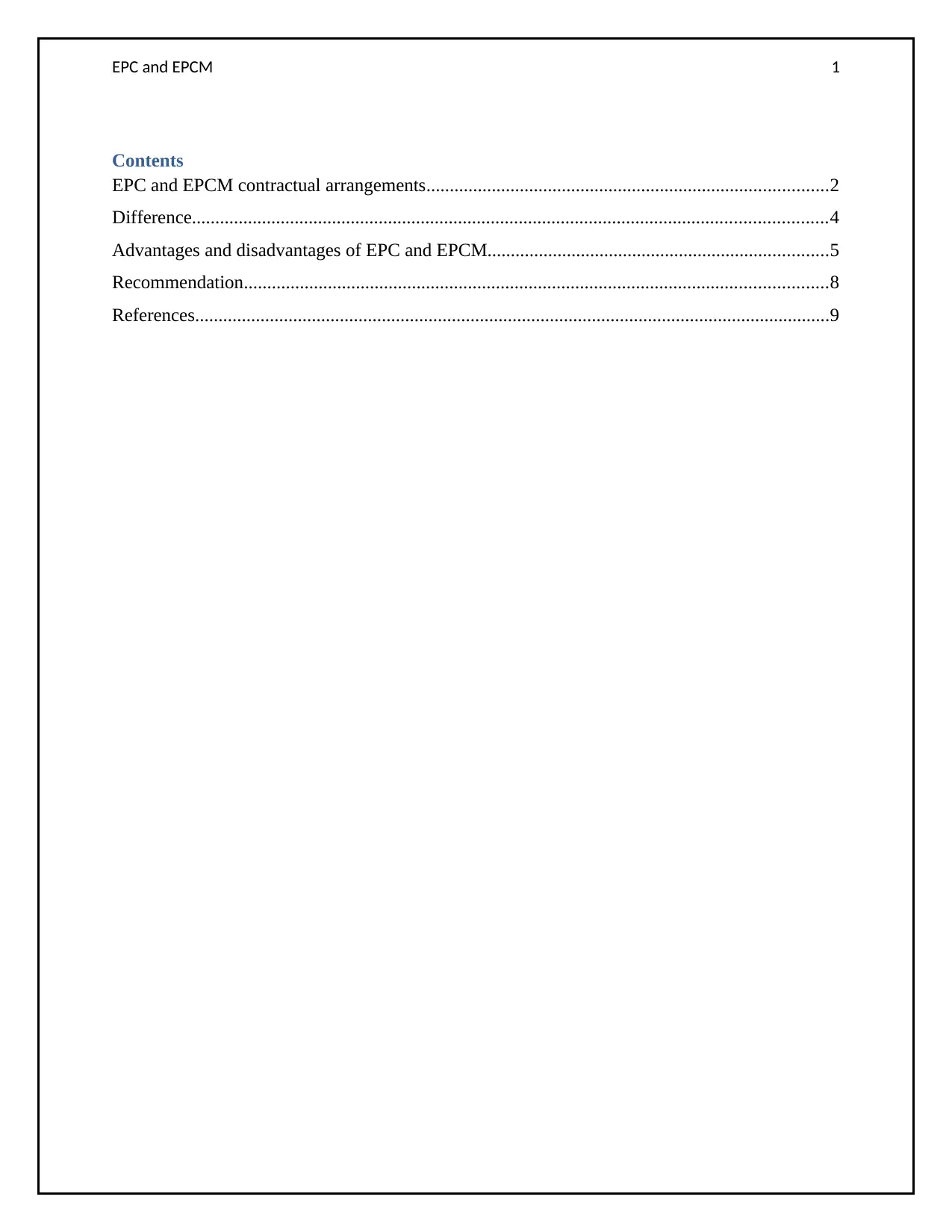
EPC and EPCM 1
Contents
EPC and EPCM contractual arrangements......................................................................................2
Difference........................................................................................................................................4
Advantages and disadvantages of EPC and EPCM.........................................................................5
Recommendation.............................................................................................................................8
References........................................................................................................................................9
Contents
EPC and EPCM contractual arrangements......................................................................................2
Difference........................................................................................................................................4
Advantages and disadvantages of EPC and EPCM.........................................................................5
Recommendation.............................................................................................................................8
References........................................................................................................................................9
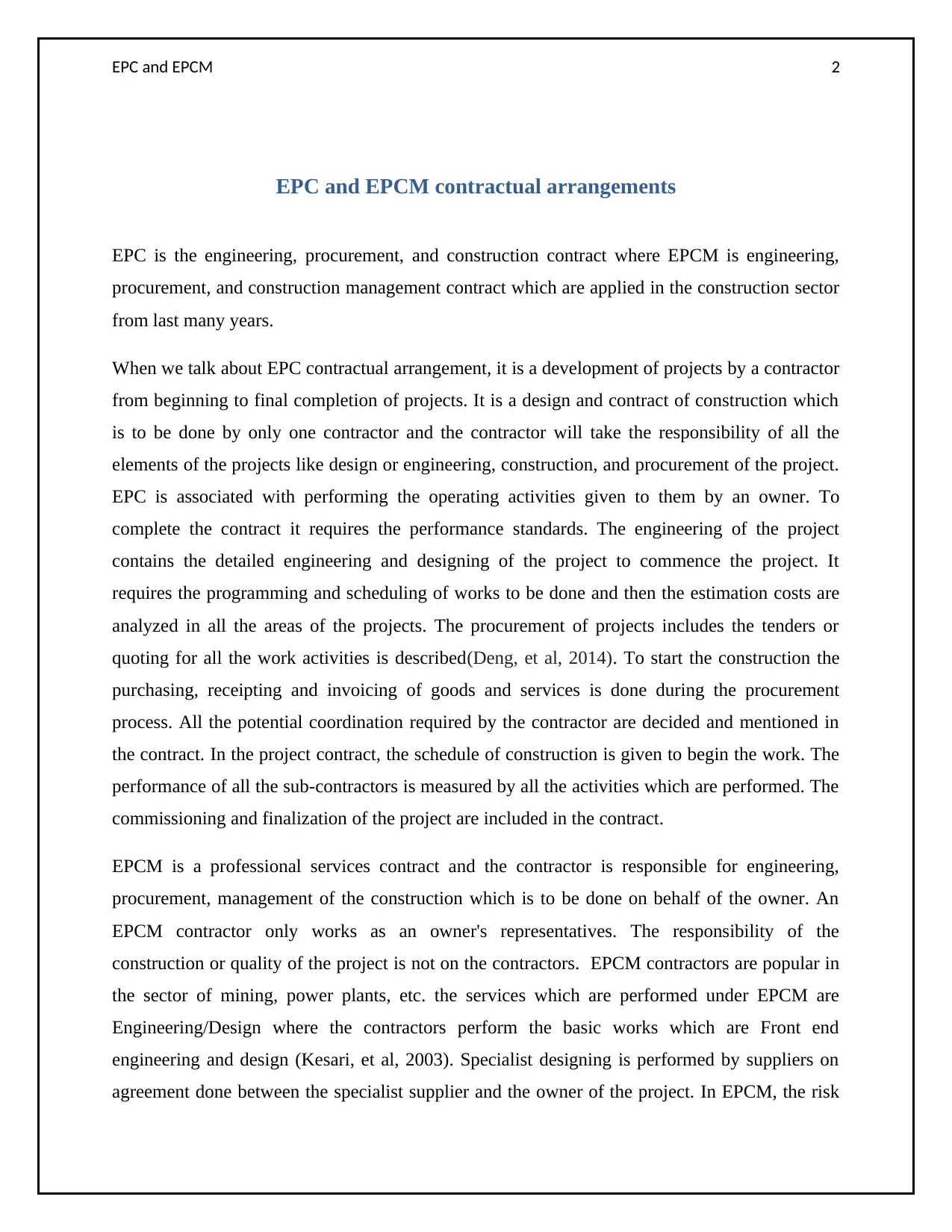
EPC and EPCM 2
EPC and EPCM contractual arrangements
EPC is the engineering, procurement, and construction contract where EPCM is engineering,
procurement, and construction management contract which are applied in the construction sector
from last many years.
When we talk about EPC contractual arrangement, it is a development of projects by a contractor
from beginning to final completion of projects. It is a design and contract of construction which
is to be done by only one contractor and the contractor will take the responsibility of all the
elements of the projects like design or engineering, construction, and procurement of the project.
EPC is associated with performing the operating activities given to them by an owner. To
complete the contract it requires the performance standards. The engineering of the project
contains the detailed engineering and designing of the project to commence the project. It
requires the programming and scheduling of works to be done and then the estimation costs are
analyzed in all the areas of the projects. The procurement of projects includes the tenders or
quoting for all the work activities is described(Deng, et al, 2014). To start the construction the
purchasing, receipting and invoicing of goods and services is done during the procurement
process. All the potential coordination required by the contractor are decided and mentioned in
the contract. In the project contract, the schedule of construction is given to begin the work. The
performance of all the sub-contractors is measured by all the activities which are performed. The
commissioning and finalization of the project are included in the contract.
EPCM is a professional services contract and the contractor is responsible for engineering,
procurement, management of the construction which is to be done on behalf of the owner. An
EPCM contractor only works as an owner's representatives. The responsibility of the
construction or quality of the project is not on the contractors. EPCM contractors are popular in
the sector of mining, power plants, etc. the services which are performed under EPCM are
Engineering/Design where the contractors perform the basic works which are Front end
engineering and design (Kesari, et al, 2003). Specialist designing is performed by suppliers on
agreement done between the specialist supplier and the owner of the project. In EPCM, the risk
EPC and EPCM contractual arrangements
EPC is the engineering, procurement, and construction contract where EPCM is engineering,
procurement, and construction management contract which are applied in the construction sector
from last many years.
When we talk about EPC contractual arrangement, it is a development of projects by a contractor
from beginning to final completion of projects. It is a design and contract of construction which
is to be done by only one contractor and the contractor will take the responsibility of all the
elements of the projects like design or engineering, construction, and procurement of the project.
EPC is associated with performing the operating activities given to them by an owner. To
complete the contract it requires the performance standards. The engineering of the project
contains the detailed engineering and designing of the project to commence the project. It
requires the programming and scheduling of works to be done and then the estimation costs are
analyzed in all the areas of the projects. The procurement of projects includes the tenders or
quoting for all the work activities is described(Deng, et al, 2014). To start the construction the
purchasing, receipting and invoicing of goods and services is done during the procurement
process. All the potential coordination required by the contractor are decided and mentioned in
the contract. In the project contract, the schedule of construction is given to begin the work. The
performance of all the sub-contractors is measured by all the activities which are performed. The
commissioning and finalization of the project are included in the contract.
EPCM is a professional services contract and the contractor is responsible for engineering,
procurement, management of the construction which is to be done on behalf of the owner. An
EPCM contractor only works as an owner's representatives. The responsibility of the
construction or quality of the project is not on the contractors. EPCM contractors are popular in
the sector of mining, power plants, etc. the services which are performed under EPCM are
Engineering/Design where the contractors perform the basic works which are Front end
engineering and design (Kesari, et al, 2003). Specialist designing is performed by suppliers on
agreement done between the specialist supplier and the owner of the project. In EPCM, the risk
⊘ This is a preview!⊘
Do you want full access?
Subscribe today to unlock all pages.

Trusted by 1+ million students worldwide
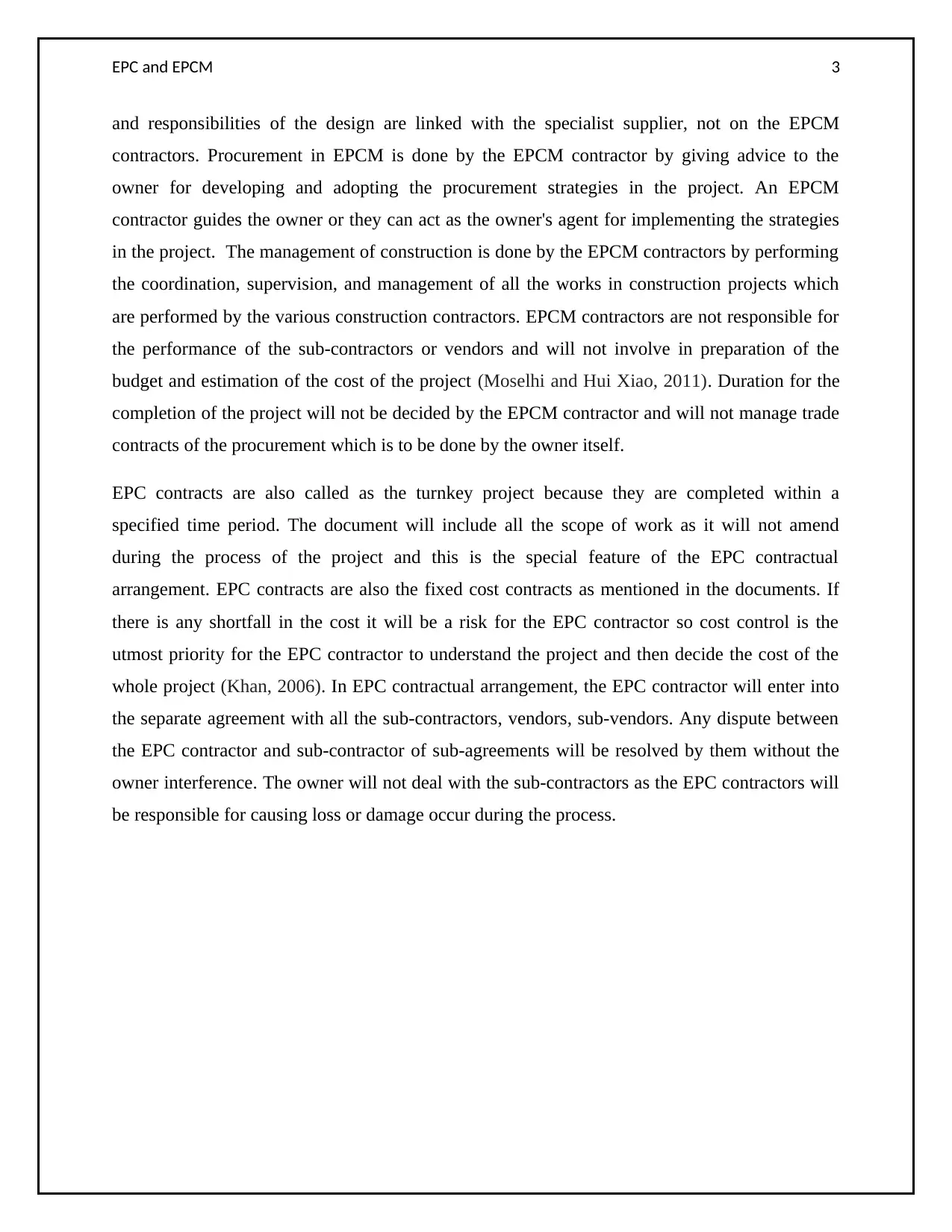
EPC and EPCM 3
and responsibilities of the design are linked with the specialist supplier, not on the EPCM
contractors. Procurement in EPCM is done by the EPCM contractor by giving advice to the
owner for developing and adopting the procurement strategies in the project. An EPCM
contractor guides the owner or they can act as the owner's agent for implementing the strategies
in the project. The management of construction is done by the EPCM contractors by performing
the coordination, supervision, and management of all the works in construction projects which
are performed by the various construction contractors. EPCM contractors are not responsible for
the performance of the sub-contractors or vendors and will not involve in preparation of the
budget and estimation of the cost of the project (Moselhi and Hui Xiao, 2011). Duration for the
completion of the project will not be decided by the EPCM contractor and will not manage trade
contracts of the procurement which is to be done by the owner itself.
EPC contracts are also called as the turnkey project because they are completed within a
specified time period. The document will include all the scope of work as it will not amend
during the process of the project and this is the special feature of the EPC contractual
arrangement. EPC contracts are also the fixed cost contracts as mentioned in the documents. If
there is any shortfall in the cost it will be a risk for the EPC contractor so cost control is the
utmost priority for the EPC contractor to understand the project and then decide the cost of the
whole project (Khan, 2006). In EPC contractual arrangement, the EPC contractor will enter into
the separate agreement with all the sub-contractors, vendors, sub-vendors. Any dispute between
the EPC contractor and sub-contractor of sub-agreements will be resolved by them without the
owner interference. The owner will not deal with the sub-contractors as the EPC contractors will
be responsible for causing loss or damage occur during the process.
and responsibilities of the design are linked with the specialist supplier, not on the EPCM
contractors. Procurement in EPCM is done by the EPCM contractor by giving advice to the
owner for developing and adopting the procurement strategies in the project. An EPCM
contractor guides the owner or they can act as the owner's agent for implementing the strategies
in the project. The management of construction is done by the EPCM contractors by performing
the coordination, supervision, and management of all the works in construction projects which
are performed by the various construction contractors. EPCM contractors are not responsible for
the performance of the sub-contractors or vendors and will not involve in preparation of the
budget and estimation of the cost of the project (Moselhi and Hui Xiao, 2011). Duration for the
completion of the project will not be decided by the EPCM contractor and will not manage trade
contracts of the procurement which is to be done by the owner itself.
EPC contracts are also called as the turnkey project because they are completed within a
specified time period. The document will include all the scope of work as it will not amend
during the process of the project and this is the special feature of the EPC contractual
arrangement. EPC contracts are also the fixed cost contracts as mentioned in the documents. If
there is any shortfall in the cost it will be a risk for the EPC contractor so cost control is the
utmost priority for the EPC contractor to understand the project and then decide the cost of the
whole project (Khan, 2006). In EPC contractual arrangement, the EPC contractor will enter into
the separate agreement with all the sub-contractors, vendors, sub-vendors. Any dispute between
the EPC contractor and sub-contractor of sub-agreements will be resolved by them without the
owner interference. The owner will not deal with the sub-contractors as the EPC contractors will
be responsible for causing loss or damage occur during the process.
Paraphrase This Document
Need a fresh take? Get an instant paraphrase of this document with our AI Paraphraser
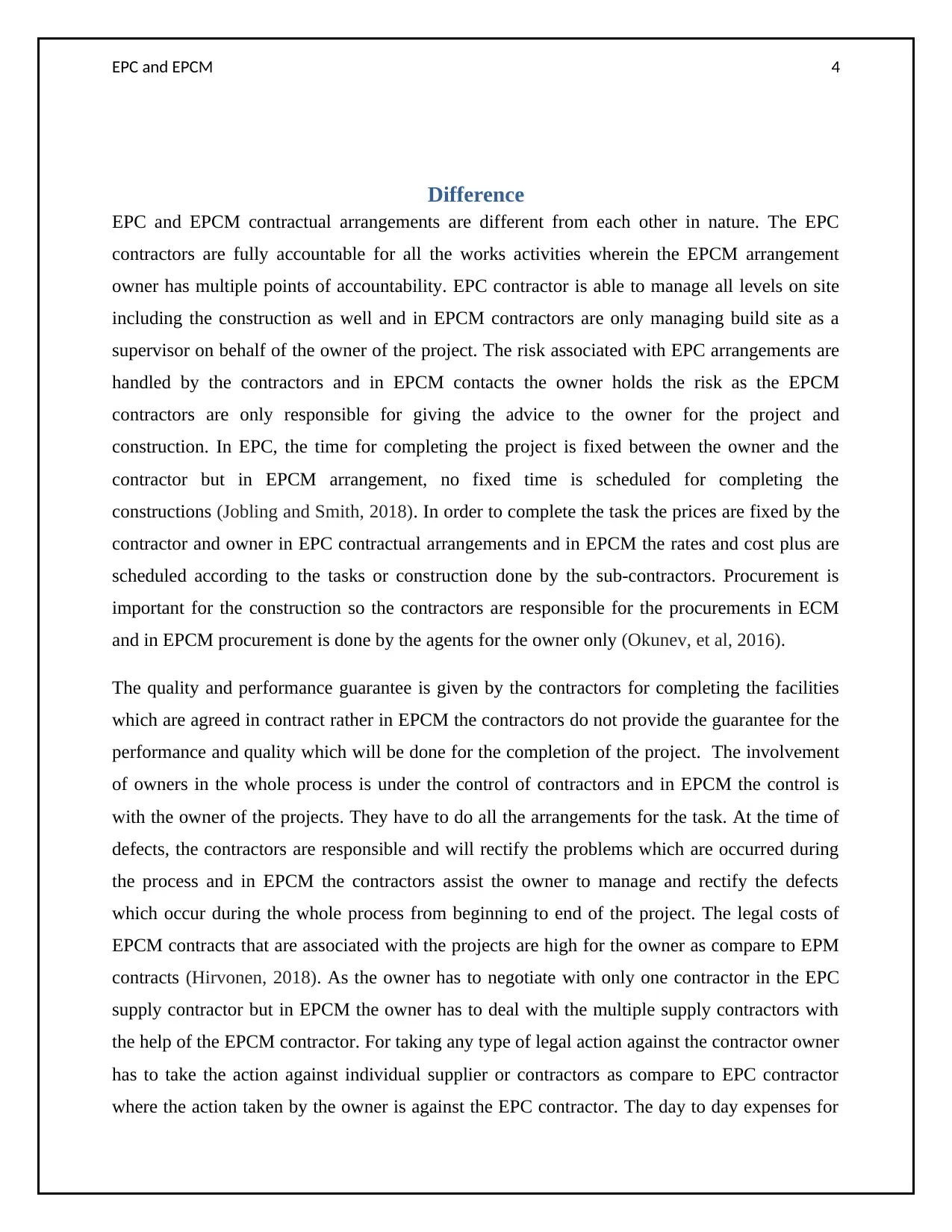
EPC and EPCM 4
Difference
EPC and EPCM contractual arrangements are different from each other in nature. The EPC
contractors are fully accountable for all the works activities wherein the EPCM arrangement
owner has multiple points of accountability. EPC contractor is able to manage all levels on site
including the construction as well and in EPCM contractors are only managing build site as a
supervisor on behalf of the owner of the project. The risk associated with EPC arrangements are
handled by the contractors and in EPCM contacts the owner holds the risk as the EPCM
contractors are only responsible for giving the advice to the owner for the project and
construction. In EPC, the time for completing the project is fixed between the owner and the
contractor but in EPCM arrangement, no fixed time is scheduled for completing the
constructions (Jobling and Smith, 2018). In order to complete the task the prices are fixed by the
contractor and owner in EPC contractual arrangements and in EPCM the rates and cost plus are
scheduled according to the tasks or construction done by the sub-contractors. Procurement is
important for the construction so the contractors are responsible for the procurements in ECM
and in EPCM procurement is done by the agents for the owner only (Okunev, et al, 2016).
The quality and performance guarantee is given by the contractors for completing the facilities
which are agreed in contract rather in EPCM the contractors do not provide the guarantee for the
performance and quality which will be done for the completion of the project. The involvement
of owners in the whole process is under the control of contractors and in EPCM the control is
with the owner of the projects. They have to do all the arrangements for the task. At the time of
defects, the contractors are responsible and will rectify the problems which are occurred during
the process and in EPCM the contractors assist the owner to manage and rectify the defects
which occur during the whole process from beginning to end of the project. The legal costs of
EPCM contracts that are associated with the projects are high for the owner as compare to EPM
contracts (Hirvonen, 2018). As the owner has to negotiate with only one contractor in the EPC
supply contractor but in EPCM the owner has to deal with the multiple supply contractors with
the help of the EPCM contractor. For taking any type of legal action against the contractor owner
has to take the action against individual supplier or contractors as compare to EPC contractor
where the action taken by the owner is against the EPC contractor. The day to day expenses for
Difference
EPC and EPCM contractual arrangements are different from each other in nature. The EPC
contractors are fully accountable for all the works activities wherein the EPCM arrangement
owner has multiple points of accountability. EPC contractor is able to manage all levels on site
including the construction as well and in EPCM contractors are only managing build site as a
supervisor on behalf of the owner of the project. The risk associated with EPC arrangements are
handled by the contractors and in EPCM contacts the owner holds the risk as the EPCM
contractors are only responsible for giving the advice to the owner for the project and
construction. In EPC, the time for completing the project is fixed between the owner and the
contractor but in EPCM arrangement, no fixed time is scheduled for completing the
constructions (Jobling and Smith, 2018). In order to complete the task the prices are fixed by the
contractor and owner in EPC contractual arrangements and in EPCM the rates and cost plus are
scheduled according to the tasks or construction done by the sub-contractors. Procurement is
important for the construction so the contractors are responsible for the procurements in ECM
and in EPCM procurement is done by the agents for the owner only (Okunev, et al, 2016).
The quality and performance guarantee is given by the contractors for completing the facilities
which are agreed in contract rather in EPCM the contractors do not provide the guarantee for the
performance and quality which will be done for the completion of the project. The involvement
of owners in the whole process is under the control of contractors and in EPCM the control is
with the owner of the projects. They have to do all the arrangements for the task. At the time of
defects, the contractors are responsible and will rectify the problems which are occurred during
the process and in EPCM the contractors assist the owner to manage and rectify the defects
which occur during the whole process from beginning to end of the project. The legal costs of
EPCM contracts that are associated with the projects are high for the owner as compare to EPM
contracts (Hirvonen, 2018). As the owner has to negotiate with only one contractor in the EPC
supply contractor but in EPCM the owner has to deal with the multiple supply contractors with
the help of the EPCM contractor. For taking any type of legal action against the contractor owner
has to take the action against individual supplier or contractors as compare to EPC contractor
where the action taken by the owner is against the EPC contractor. The day to day expenses for
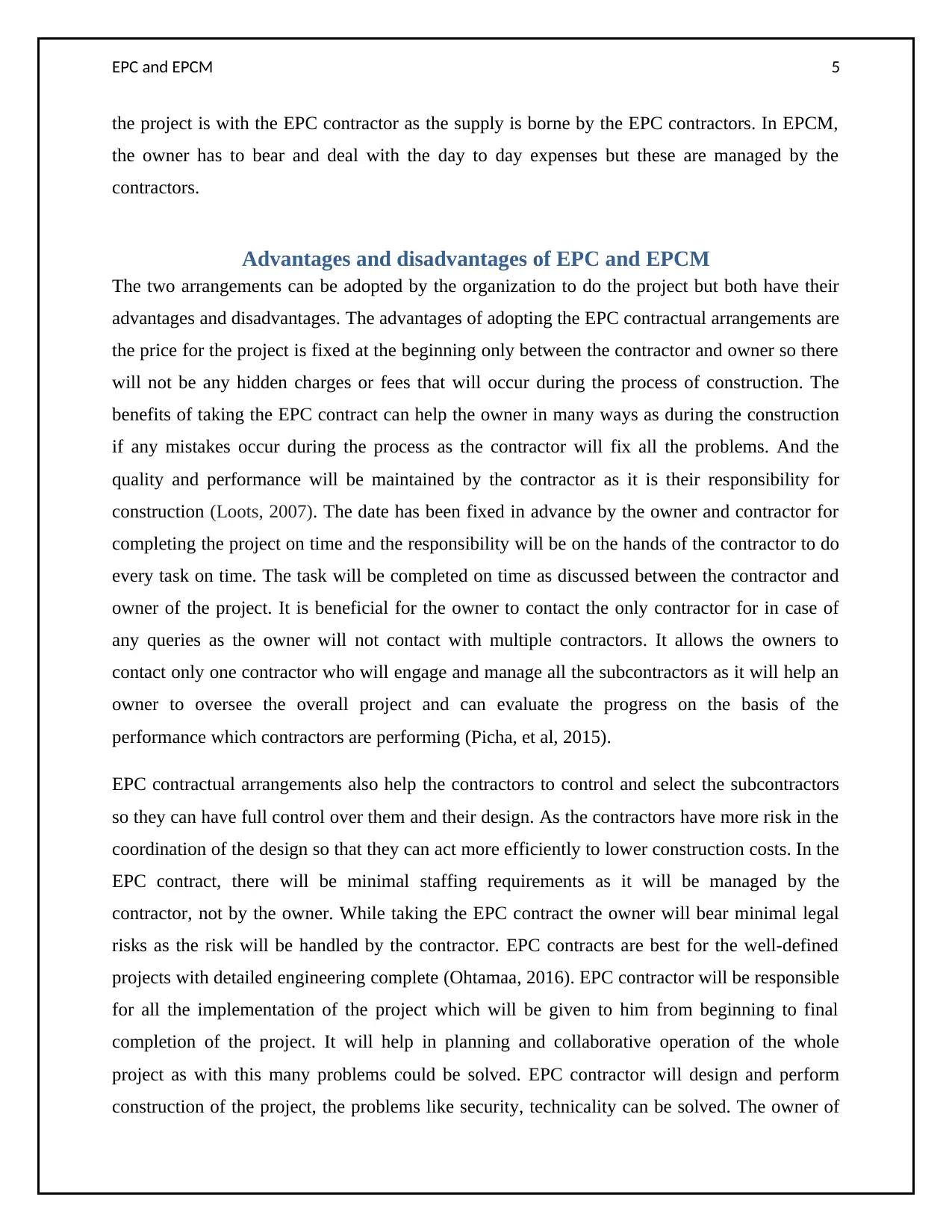
EPC and EPCM 5
the project is with the EPC contractor as the supply is borne by the EPC contractors. In EPCM,
the owner has to bear and deal with the day to day expenses but these are managed by the
contractors.
Advantages and disadvantages of EPC and EPCM
The two arrangements can be adopted by the organization to do the project but both have their
advantages and disadvantages. The advantages of adopting the EPC contractual arrangements are
the price for the project is fixed at the beginning only between the contractor and owner so there
will not be any hidden charges or fees that will occur during the process of construction. The
benefits of taking the EPC contract can help the owner in many ways as during the construction
if any mistakes occur during the process as the contractor will fix all the problems. And the
quality and performance will be maintained by the contractor as it is their responsibility for
construction (Loots, 2007). The date has been fixed in advance by the owner and contractor for
completing the project on time and the responsibility will be on the hands of the contractor to do
every task on time. The task will be completed on time as discussed between the contractor and
owner of the project. It is beneficial for the owner to contact the only contractor for in case of
any queries as the owner will not contact with multiple contractors. It allows the owners to
contact only one contractor who will engage and manage all the subcontractors as it will help an
owner to oversee the overall project and can evaluate the progress on the basis of the
performance which contractors are performing (Picha, et al, 2015).
EPC contractual arrangements also help the contractors to control and select the subcontractors
so they can have full control over them and their design. As the contractors have more risk in the
coordination of the design so that they can act more efficiently to lower construction costs. In the
EPC contract, there will be minimal staffing requirements as it will be managed by the
contractor, not by the owner. While taking the EPC contract the owner will bear minimal legal
risks as the risk will be handled by the contractor. EPC contracts are best for the well-defined
projects with detailed engineering complete (Ohtamaa, 2016). EPC contractor will be responsible
for all the implementation of the project which will be given to him from beginning to final
completion of the project. It will help in planning and collaborative operation of the whole
project as with this many problems could be solved. EPC contractor will design and perform
construction of the project, the problems like security, technicality can be solved. The owner of
the project is with the EPC contractor as the supply is borne by the EPC contractors. In EPCM,
the owner has to bear and deal with the day to day expenses but these are managed by the
contractors.
Advantages and disadvantages of EPC and EPCM
The two arrangements can be adopted by the organization to do the project but both have their
advantages and disadvantages. The advantages of adopting the EPC contractual arrangements are
the price for the project is fixed at the beginning only between the contractor and owner so there
will not be any hidden charges or fees that will occur during the process of construction. The
benefits of taking the EPC contract can help the owner in many ways as during the construction
if any mistakes occur during the process as the contractor will fix all the problems. And the
quality and performance will be maintained by the contractor as it is their responsibility for
construction (Loots, 2007). The date has been fixed in advance by the owner and contractor for
completing the project on time and the responsibility will be on the hands of the contractor to do
every task on time. The task will be completed on time as discussed between the contractor and
owner of the project. It is beneficial for the owner to contact the only contractor for in case of
any queries as the owner will not contact with multiple contractors. It allows the owners to
contact only one contractor who will engage and manage all the subcontractors as it will help an
owner to oversee the overall project and can evaluate the progress on the basis of the
performance which contractors are performing (Picha, et al, 2015).
EPC contractual arrangements also help the contractors to control and select the subcontractors
so they can have full control over them and their design. As the contractors have more risk in the
coordination of the design so that they can act more efficiently to lower construction costs. In the
EPC contract, there will be minimal staffing requirements as it will be managed by the
contractor, not by the owner. While taking the EPC contract the owner will bear minimal legal
risks as the risk will be handled by the contractor. EPC contracts are best for the well-defined
projects with detailed engineering complete (Ohtamaa, 2016). EPC contractor will be responsible
for all the implementation of the project which will be given to him from beginning to final
completion of the project. It will help in planning and collaborative operation of the whole
project as with this many problems could be solved. EPC contractor will design and perform
construction of the project, the problems like security, technicality can be solved. The owner of
⊘ This is a preview!⊘
Do you want full access?
Subscribe today to unlock all pages.

Trusted by 1+ million students worldwide
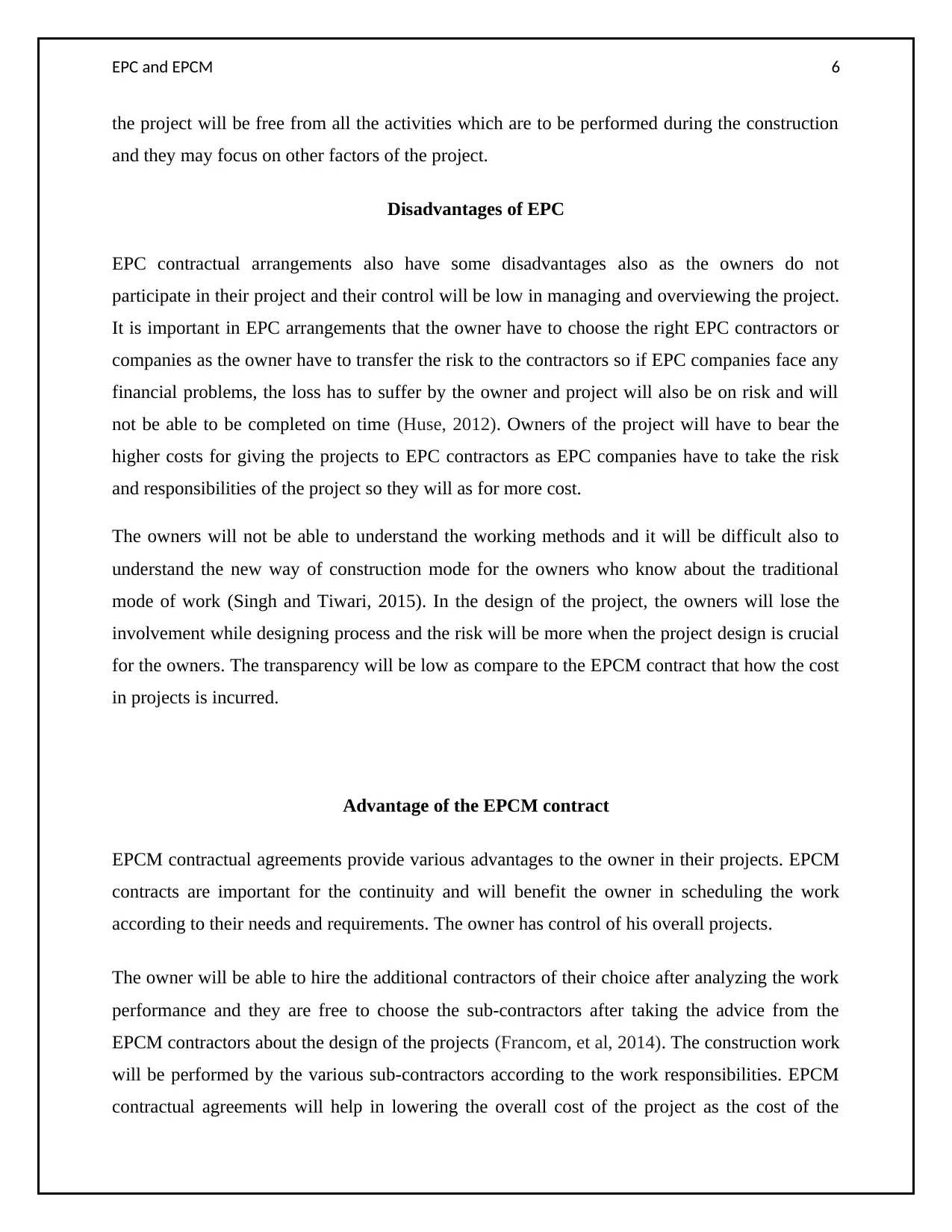
EPC and EPCM 6
the project will be free from all the activities which are to be performed during the construction
and they may focus on other factors of the project.
Disadvantages of EPC
EPC contractual arrangements also have some disadvantages also as the owners do not
participate in their project and their control will be low in managing and overviewing the project.
It is important in EPC arrangements that the owner have to choose the right EPC contractors or
companies as the owner have to transfer the risk to the contractors so if EPC companies face any
financial problems, the loss has to suffer by the owner and project will also be on risk and will
not be able to be completed on time (Huse, 2012). Owners of the project will have to bear the
higher costs for giving the projects to EPC contractors as EPC companies have to take the risk
and responsibilities of the project so they will as for more cost.
The owners will not be able to understand the working methods and it will be difficult also to
understand the new way of construction mode for the owners who know about the traditional
mode of work (Singh and Tiwari, 2015). In the design of the project, the owners will lose the
involvement while designing process and the risk will be more when the project design is crucial
for the owners. The transparency will be low as compare to the EPCM contract that how the cost
in projects is incurred.
Advantage of the EPCM contract
EPCM contractual agreements provide various advantages to the owner in their projects. EPCM
contracts are important for the continuity and will benefit the owner in scheduling the work
according to their needs and requirements. The owner has control of his overall projects.
The owner will be able to hire the additional contractors of their choice after analyzing the work
performance and they are free to choose the sub-contractors after taking the advice from the
EPCM contractors about the design of the projects (Francom, et al, 2014). The construction work
will be performed by the various sub-contractors according to the work responsibilities. EPCM
contractual agreements will help in lowering the overall cost of the project as the cost of the
the project will be free from all the activities which are to be performed during the construction
and they may focus on other factors of the project.
Disadvantages of EPC
EPC contractual arrangements also have some disadvantages also as the owners do not
participate in their project and their control will be low in managing and overviewing the project.
It is important in EPC arrangements that the owner have to choose the right EPC contractors or
companies as the owner have to transfer the risk to the contractors so if EPC companies face any
financial problems, the loss has to suffer by the owner and project will also be on risk and will
not be able to be completed on time (Huse, 2012). Owners of the project will have to bear the
higher costs for giving the projects to EPC contractors as EPC companies have to take the risk
and responsibilities of the project so they will as for more cost.
The owners will not be able to understand the working methods and it will be difficult also to
understand the new way of construction mode for the owners who know about the traditional
mode of work (Singh and Tiwari, 2015). In the design of the project, the owners will lose the
involvement while designing process and the risk will be more when the project design is crucial
for the owners. The transparency will be low as compare to the EPCM contract that how the cost
in projects is incurred.
Advantage of the EPCM contract
EPCM contractual agreements provide various advantages to the owner in their projects. EPCM
contracts are important for the continuity and will benefit the owner in scheduling the work
according to their needs and requirements. The owner has control of his overall projects.
The owner will be able to hire the additional contractors of their choice after analyzing the work
performance and they are free to choose the sub-contractors after taking the advice from the
EPCM contractors about the design of the projects (Francom, et al, 2014). The construction work
will be performed by the various sub-contractors according to the work responsibilities. EPCM
contractual agreements will help in lowering the overall cost of the project as the cost of the
Paraphrase This Document
Need a fresh take? Get an instant paraphrase of this document with our AI Paraphraser
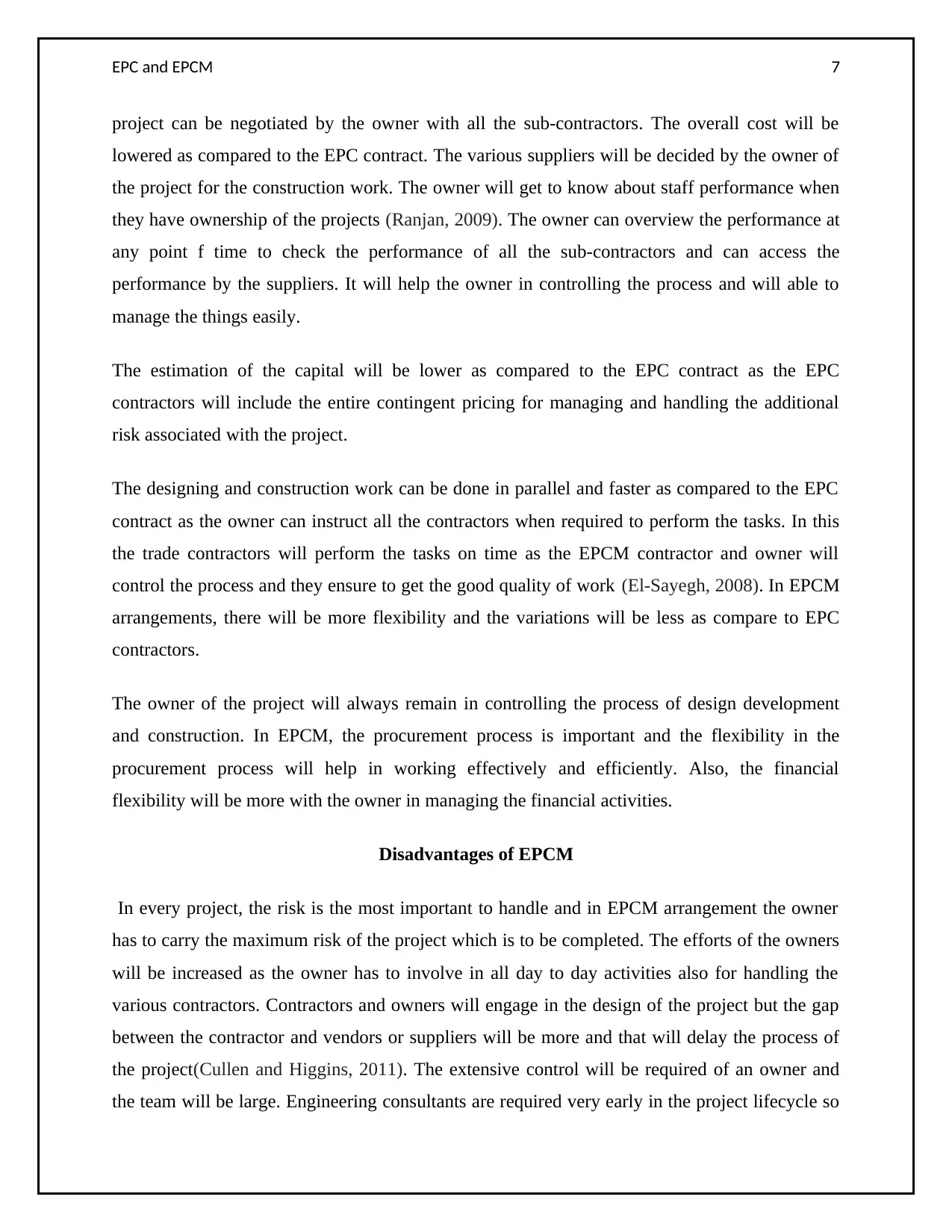
EPC and EPCM 7
project can be negotiated by the owner with all the sub-contractors. The overall cost will be
lowered as compared to the EPC contract. The various suppliers will be decided by the owner of
the project for the construction work. The owner will get to know about staff performance when
they have ownership of the projects (Ranjan, 2009). The owner can overview the performance at
any point f time to check the performance of all the sub-contractors and can access the
performance by the suppliers. It will help the owner in controlling the process and will able to
manage the things easily.
The estimation of the capital will be lower as compared to the EPC contract as the EPC
contractors will include the entire contingent pricing for managing and handling the additional
risk associated with the project.
The designing and construction work can be done in parallel and faster as compared to the EPC
contract as the owner can instruct all the contractors when required to perform the tasks. In this
the trade contractors will perform the tasks on time as the EPCM contractor and owner will
control the process and they ensure to get the good quality of work (El-Sayegh, 2008). In EPCM
arrangements, there will be more flexibility and the variations will be less as compare to EPC
contractors.
The owner of the project will always remain in controlling the process of design development
and construction. In EPCM, the procurement process is important and the flexibility in the
procurement process will help in working effectively and efficiently. Also, the financial
flexibility will be more with the owner in managing the financial activities.
Disadvantages of EPCM
In every project, the risk is the most important to handle and in EPCM arrangement the owner
has to carry the maximum risk of the project which is to be completed. The efforts of the owners
will be increased as the owner has to involve in all day to day activities also for handling the
various contractors. Contractors and owners will engage in the design of the project but the gap
between the contractor and vendors or suppliers will be more and that will delay the process of
the project(Cullen and Higgins, 2011). The extensive control will be required of an owner and
the team will be large. Engineering consultants are required very early in the project lifecycle so
project can be negotiated by the owner with all the sub-contractors. The overall cost will be
lowered as compared to the EPC contract. The various suppliers will be decided by the owner of
the project for the construction work. The owner will get to know about staff performance when
they have ownership of the projects (Ranjan, 2009). The owner can overview the performance at
any point f time to check the performance of all the sub-contractors and can access the
performance by the suppliers. It will help the owner in controlling the process and will able to
manage the things easily.
The estimation of the capital will be lower as compared to the EPC contract as the EPC
contractors will include the entire contingent pricing for managing and handling the additional
risk associated with the project.
The designing and construction work can be done in parallel and faster as compared to the EPC
contract as the owner can instruct all the contractors when required to perform the tasks. In this
the trade contractors will perform the tasks on time as the EPCM contractor and owner will
control the process and they ensure to get the good quality of work (El-Sayegh, 2008). In EPCM
arrangements, there will be more flexibility and the variations will be less as compare to EPC
contractors.
The owner of the project will always remain in controlling the process of design development
and construction. In EPCM, the procurement process is important and the flexibility in the
procurement process will help in working effectively and efficiently. Also, the financial
flexibility will be more with the owner in managing the financial activities.
Disadvantages of EPCM
In every project, the risk is the most important to handle and in EPCM arrangement the owner
has to carry the maximum risk of the project which is to be completed. The efforts of the owners
will be increased as the owner has to involve in all day to day activities also for handling the
various contractors. Contractors and owners will engage in the design of the project but the gap
between the contractor and vendors or suppliers will be more and that will delay the process of
the project(Cullen and Higgins, 2011). The extensive control will be required of an owner and
the team will be large. Engineering consultants are required very early in the project lifecycle so
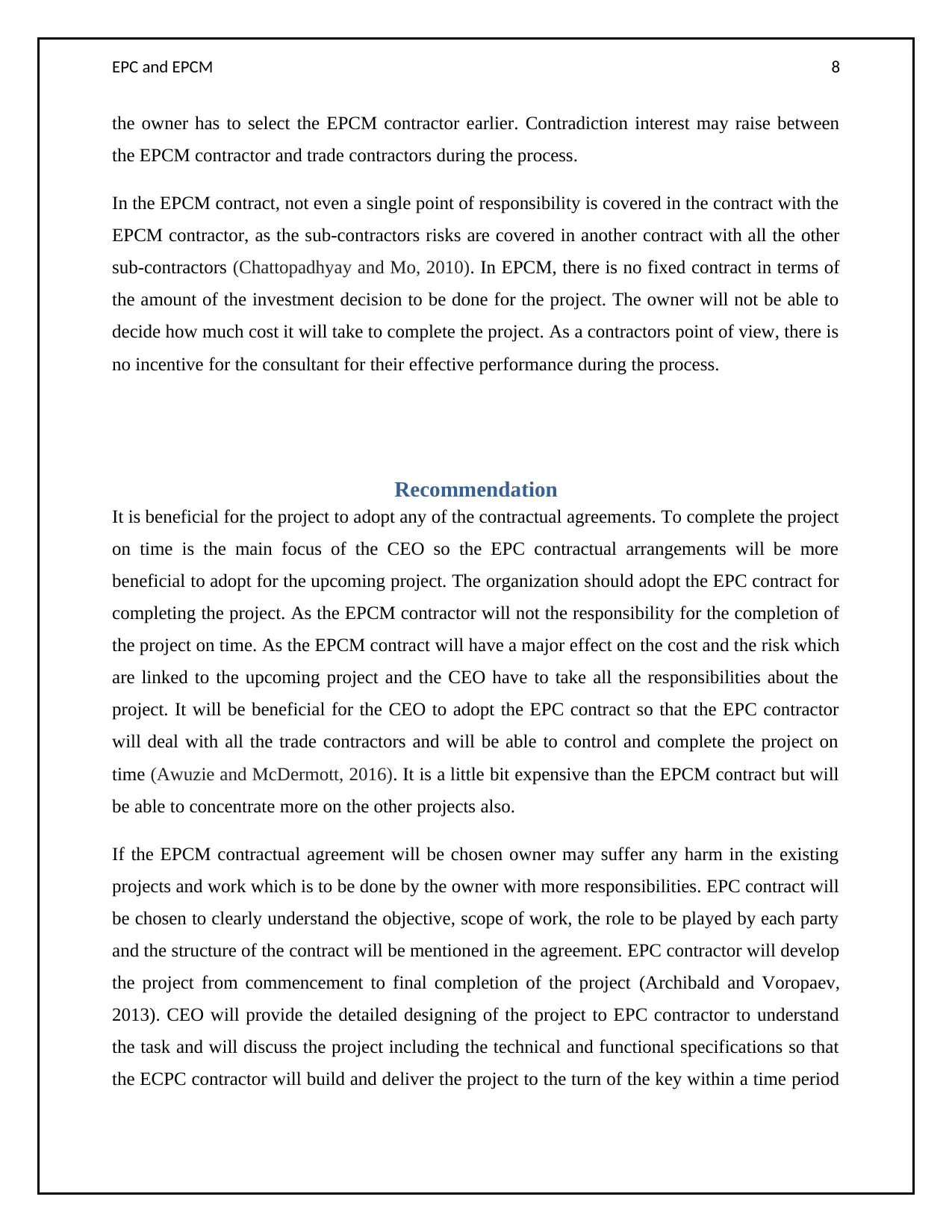
EPC and EPCM 8
the owner has to select the EPCM contractor earlier. Contradiction interest may raise between
the EPCM contractor and trade contractors during the process.
In the EPCM contract, not even a single point of responsibility is covered in the contract with the
EPCM contractor, as the sub-contractors risks are covered in another contract with all the other
sub-contractors (Chattopadhyay and Mo, 2010). In EPCM, there is no fixed contract in terms of
the amount of the investment decision to be done for the project. The owner will not be able to
decide how much cost it will take to complete the project. As a contractors point of view, there is
no incentive for the consultant for their effective performance during the process.
Recommendation
It is beneficial for the project to adopt any of the contractual agreements. To complete the project
on time is the main focus of the CEO so the EPC contractual arrangements will be more
beneficial to adopt for the upcoming project. The organization should adopt the EPC contract for
completing the project. As the EPCM contractor will not the responsibility for the completion of
the project on time. As the EPCM contract will have a major effect on the cost and the risk which
are linked to the upcoming project and the CEO have to take all the responsibilities about the
project. It will be beneficial for the CEO to adopt the EPC contract so that the EPC contractor
will deal with all the trade contractors and will be able to control and complete the project on
time (Awuzie and McDermott, 2016). It is a little bit expensive than the EPCM contract but will
be able to concentrate more on the other projects also.
If the EPCM contractual agreement will be chosen owner may suffer any harm in the existing
projects and work which is to be done by the owner with more responsibilities. EPC contract will
be chosen to clearly understand the objective, scope of work, the role to be played by each party
and the structure of the contract will be mentioned in the agreement. EPC contractor will develop
the project from commencement to final completion of the project (Archibald and Voropaev,
2013). CEO will provide the detailed designing of the project to EPC contractor to understand
the task and will discuss the project including the technical and functional specifications so that
the ECPC contractor will build and deliver the project to the turn of the key within a time period
the owner has to select the EPCM contractor earlier. Contradiction interest may raise between
the EPCM contractor and trade contractors during the process.
In the EPCM contract, not even a single point of responsibility is covered in the contract with the
EPCM contractor, as the sub-contractors risks are covered in another contract with all the other
sub-contractors (Chattopadhyay and Mo, 2010). In EPCM, there is no fixed contract in terms of
the amount of the investment decision to be done for the project. The owner will not be able to
decide how much cost it will take to complete the project. As a contractors point of view, there is
no incentive for the consultant for their effective performance during the process.
Recommendation
It is beneficial for the project to adopt any of the contractual agreements. To complete the project
on time is the main focus of the CEO so the EPC contractual arrangements will be more
beneficial to adopt for the upcoming project. The organization should adopt the EPC contract for
completing the project. As the EPCM contractor will not the responsibility for the completion of
the project on time. As the EPCM contract will have a major effect on the cost and the risk which
are linked to the upcoming project and the CEO have to take all the responsibilities about the
project. It will be beneficial for the CEO to adopt the EPC contract so that the EPC contractor
will deal with all the trade contractors and will be able to control and complete the project on
time (Awuzie and McDermott, 2016). It is a little bit expensive than the EPCM contract but will
be able to concentrate more on the other projects also.
If the EPCM contractual agreement will be chosen owner may suffer any harm in the existing
projects and work which is to be done by the owner with more responsibilities. EPC contract will
be chosen to clearly understand the objective, scope of work, the role to be played by each party
and the structure of the contract will be mentioned in the agreement. EPC contractor will develop
the project from commencement to final completion of the project (Archibald and Voropaev,
2013). CEO will provide the detailed designing of the project to EPC contractor to understand
the task and will discuss the project including the technical and functional specifications so that
the ECPC contractor will build and deliver the project to the turn of the key within a time period
⊘ This is a preview!⊘
Do you want full access?
Subscribe today to unlock all pages.

Trusted by 1+ million students worldwide
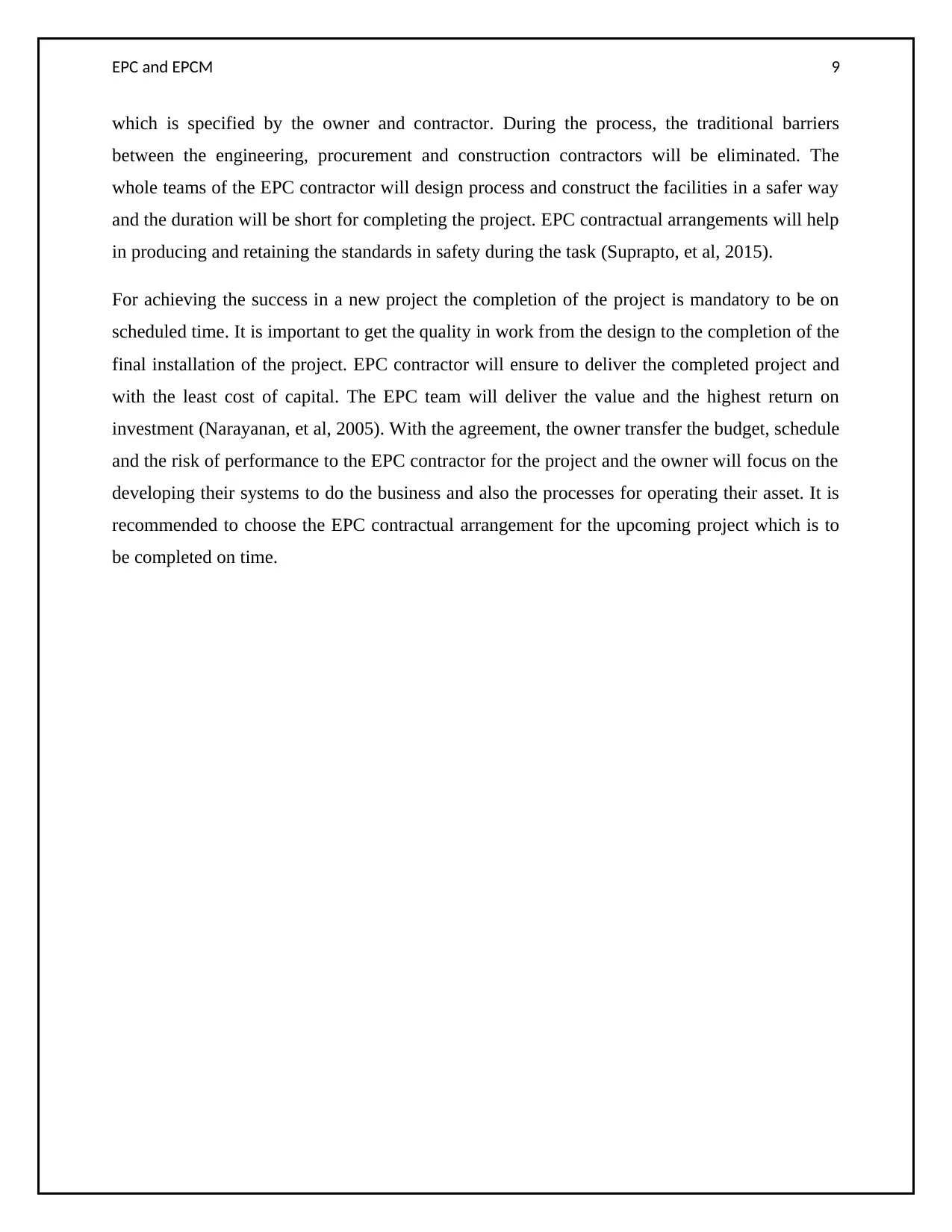
EPC and EPCM 9
which is specified by the owner and contractor. During the process, the traditional barriers
between the engineering, procurement and construction contractors will be eliminated. The
whole teams of the EPC contractor will design process and construct the facilities in a safer way
and the duration will be short for completing the project. EPC contractual arrangements will help
in producing and retaining the standards in safety during the task (Suprapto, et al, 2015).
For achieving the success in a new project the completion of the project is mandatory to be on
scheduled time. It is important to get the quality in work from the design to the completion of the
final installation of the project. EPC contractor will ensure to deliver the completed project and
with the least cost of capital. The EPC team will deliver the value and the highest return on
investment (Narayanan, et al, 2005). With the agreement, the owner transfer the budget, schedule
and the risk of performance to the EPC contractor for the project and the owner will focus on the
developing their systems to do the business and also the processes for operating their asset. It is
recommended to choose the EPC contractual arrangement for the upcoming project which is to
be completed on time.
which is specified by the owner and contractor. During the process, the traditional barriers
between the engineering, procurement and construction contractors will be eliminated. The
whole teams of the EPC contractor will design process and construct the facilities in a safer way
and the duration will be short for completing the project. EPC contractual arrangements will help
in producing and retaining the standards in safety during the task (Suprapto, et al, 2015).
For achieving the success in a new project the completion of the project is mandatory to be on
scheduled time. It is important to get the quality in work from the design to the completion of the
final installation of the project. EPC contractor will ensure to deliver the completed project and
with the least cost of capital. The EPC team will deliver the value and the highest return on
investment (Narayanan, et al, 2005). With the agreement, the owner transfer the budget, schedule
and the risk of performance to the EPC contractor for the project and the owner will focus on the
developing their systems to do the business and also the processes for operating their asset. It is
recommended to choose the EPC contractual arrangement for the upcoming project which is to
be completed on time.
Paraphrase This Document
Need a fresh take? Get an instant paraphrase of this document with our AI Paraphraser
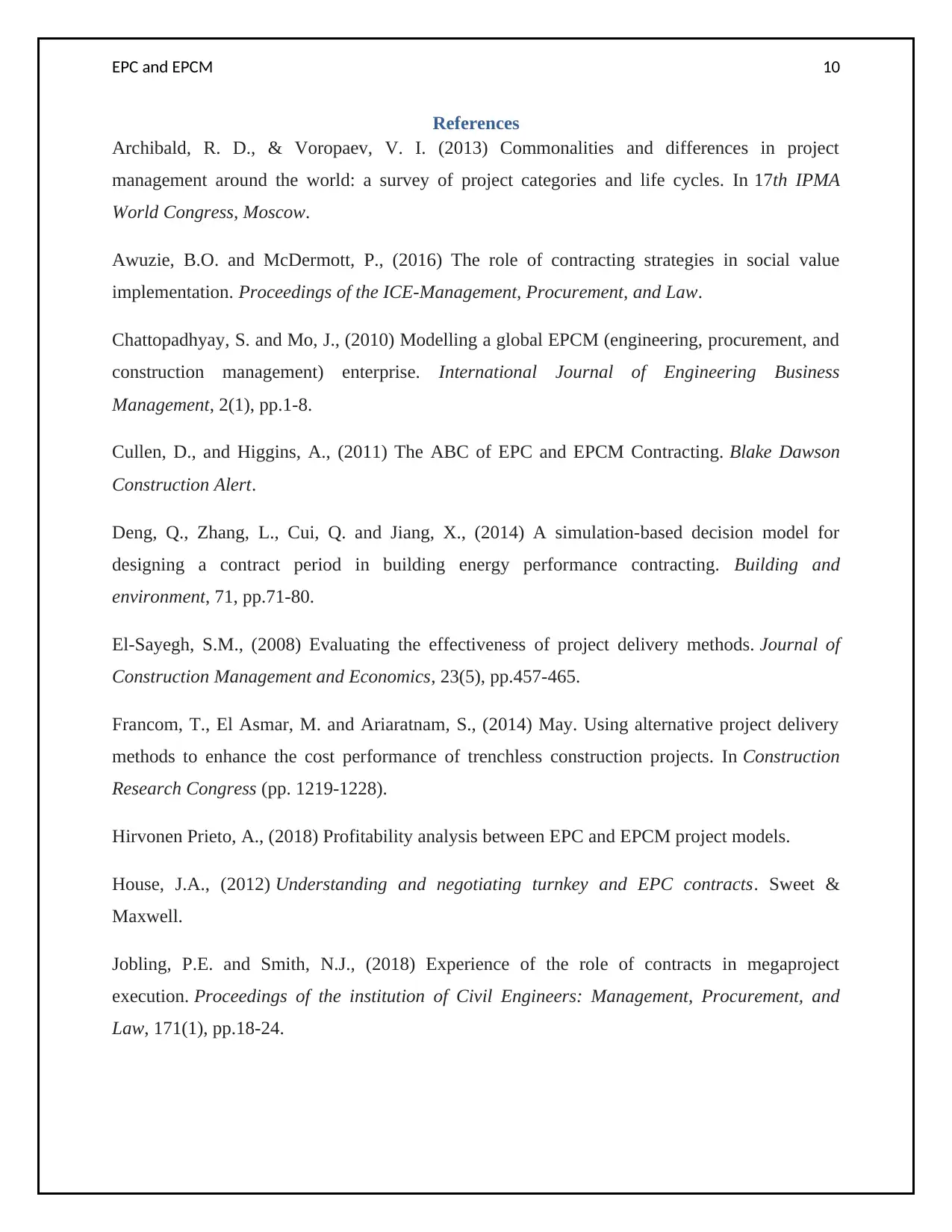
EPC and EPCM 10
References
Archibald, R. D., & Voropaev, V. I. (2013) Commonalities and differences in project
management around the world: a survey of project categories and life cycles. In 17th IPMA
World Congress, Moscow.
Awuzie, B.O. and McDermott, P., (2016) The role of contracting strategies in social value
implementation. Proceedings of the ICE-Management, Procurement, and Law.
Chattopadhyay, S. and Mo, J., (2010) Modelling a global EPCM (engineering, procurement, and
construction management) enterprise. International Journal of Engineering Business
Management, 2(1), pp.1-8.
Cullen, D., and Higgins, A., (2011) The ABC of EPC and EPCM Contracting. Blake Dawson
Construction Alert.
Deng, Q., Zhang, L., Cui, Q. and Jiang, X., (2014) A simulation-based decision model for
designing a contract period in building energy performance contracting. Building and
environment, 71, pp.71-80.
El-Sayegh, S.M., (2008) Evaluating the effectiveness of project delivery methods. Journal of
Construction Management and Economics, 23(5), pp.457-465.
Francom, T., El Asmar, M. and Ariaratnam, S., (2014) May. Using alternative project delivery
methods to enhance the cost performance of trenchless construction projects. In Construction
Research Congress (pp. 1219-1228).
Hirvonen Prieto, A., (2018) Profitability analysis between EPC and EPCM project models.
House, J.A., (2012) Understanding and negotiating turnkey and EPC contracts. Sweet &
Maxwell.
Jobling, P.E. and Smith, N.J., (2018) Experience of the role of contracts in megaproject
execution. Proceedings of the institution of Civil Engineers: Management, Procurement, and
Law, 171(1), pp.18-24.
References
Archibald, R. D., & Voropaev, V. I. (2013) Commonalities and differences in project
management around the world: a survey of project categories and life cycles. In 17th IPMA
World Congress, Moscow.
Awuzie, B.O. and McDermott, P., (2016) The role of contracting strategies in social value
implementation. Proceedings of the ICE-Management, Procurement, and Law.
Chattopadhyay, S. and Mo, J., (2010) Modelling a global EPCM (engineering, procurement, and
construction management) enterprise. International Journal of Engineering Business
Management, 2(1), pp.1-8.
Cullen, D., and Higgins, A., (2011) The ABC of EPC and EPCM Contracting. Blake Dawson
Construction Alert.
Deng, Q., Zhang, L., Cui, Q. and Jiang, X., (2014) A simulation-based decision model for
designing a contract period in building energy performance contracting. Building and
environment, 71, pp.71-80.
El-Sayegh, S.M., (2008) Evaluating the effectiveness of project delivery methods. Journal of
Construction Management and Economics, 23(5), pp.457-465.
Francom, T., El Asmar, M. and Ariaratnam, S., (2014) May. Using alternative project delivery
methods to enhance the cost performance of trenchless construction projects. In Construction
Research Congress (pp. 1219-1228).
Hirvonen Prieto, A., (2018) Profitability analysis between EPC and EPCM project models.
House, J.A., (2012) Understanding and negotiating turnkey and EPC contracts. Sweet &
Maxwell.
Jobling, P.E. and Smith, N.J., (2018) Experience of the role of contracts in megaproject
execution. Proceedings of the institution of Civil Engineers: Management, Procurement, and
Law, 171(1), pp.18-24.
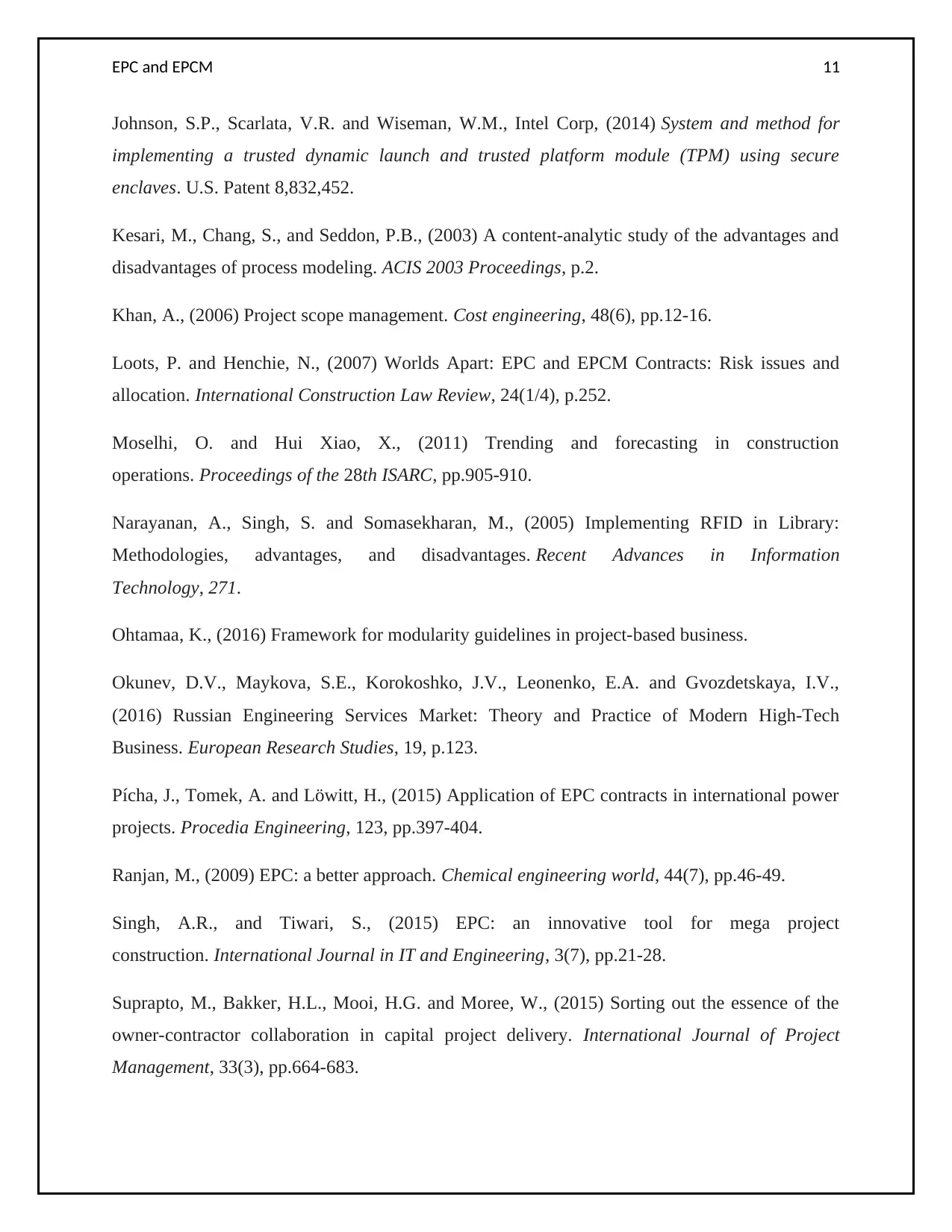
EPC and EPCM 11
Johnson, S.P., Scarlata, V.R. and Wiseman, W.M., Intel Corp, (2014) System and method for
implementing a trusted dynamic launch and trusted platform module (TPM) using secure
enclaves. U.S. Patent 8,832,452.
Kesari, M., Chang, S., and Seddon, P.B., (2003) A content-analytic study of the advantages and
disadvantages of process modeling. ACIS 2003 Proceedings, p.2.
Khan, A., (2006) Project scope management. Cost engineering, 48(6), pp.12-16.
Loots, P. and Henchie, N., (2007) Worlds Apart: EPC and EPCM Contracts: Risk issues and
allocation. International Construction Law Review, 24(1/4), p.252.
Moselhi, O. and Hui Xiao, X., (2011) Trending and forecasting in construction
operations. Proceedings of the 28th ISARC, pp.905-910.
Narayanan, A., Singh, S. and Somasekharan, M., (2005) Implementing RFID in Library:
Methodologies, advantages, and disadvantages. Recent Advances in Information
Technology, 271.
Ohtamaa, K., (2016) Framework for modularity guidelines in project-based business.
Okunev, D.V., Maykova, S.E., Korokoshko, J.V., Leonenko, E.A. and Gvozdetskaya, I.V.,
(2016) Russian Engineering Services Market: Theory and Practice of Modern High-Tech
Business. European Research Studies, 19, p.123.
Pícha, J., Tomek, A. and Löwitt, H., (2015) Application of EPC contracts in international power
projects. Procedia Engineering, 123, pp.397-404.
Ranjan, M., (2009) EPC: a better approach. Chemical engineering world, 44(7), pp.46-49.
Singh, A.R., and Tiwari, S., (2015) EPC: an innovative tool for mega project
construction. International Journal in IT and Engineering, 3(7), pp.21-28.
Suprapto, M., Bakker, H.L., Mooi, H.G. and Moree, W., (2015) Sorting out the essence of the
owner-contractor collaboration in capital project delivery. International Journal of Project
Management, 33(3), pp.664-683.
Johnson, S.P., Scarlata, V.R. and Wiseman, W.M., Intel Corp, (2014) System and method for
implementing a trusted dynamic launch and trusted platform module (TPM) using secure
enclaves. U.S. Patent 8,832,452.
Kesari, M., Chang, S., and Seddon, P.B., (2003) A content-analytic study of the advantages and
disadvantages of process modeling. ACIS 2003 Proceedings, p.2.
Khan, A., (2006) Project scope management. Cost engineering, 48(6), pp.12-16.
Loots, P. and Henchie, N., (2007) Worlds Apart: EPC and EPCM Contracts: Risk issues and
allocation. International Construction Law Review, 24(1/4), p.252.
Moselhi, O. and Hui Xiao, X., (2011) Trending and forecasting in construction
operations. Proceedings of the 28th ISARC, pp.905-910.
Narayanan, A., Singh, S. and Somasekharan, M., (2005) Implementing RFID in Library:
Methodologies, advantages, and disadvantages. Recent Advances in Information
Technology, 271.
Ohtamaa, K., (2016) Framework for modularity guidelines in project-based business.
Okunev, D.V., Maykova, S.E., Korokoshko, J.V., Leonenko, E.A. and Gvozdetskaya, I.V.,
(2016) Russian Engineering Services Market: Theory and Practice of Modern High-Tech
Business. European Research Studies, 19, p.123.
Pícha, J., Tomek, A. and Löwitt, H., (2015) Application of EPC contracts in international power
projects. Procedia Engineering, 123, pp.397-404.
Ranjan, M., (2009) EPC: a better approach. Chemical engineering world, 44(7), pp.46-49.
Singh, A.R., and Tiwari, S., (2015) EPC: an innovative tool for mega project
construction. International Journal in IT and Engineering, 3(7), pp.21-28.
Suprapto, M., Bakker, H.L., Mooi, H.G. and Moree, W., (2015) Sorting out the essence of the
owner-contractor collaboration in capital project delivery. International Journal of Project
Management, 33(3), pp.664-683.
⊘ This is a preview!⊘
Do you want full access?
Subscribe today to unlock all pages.

Trusted by 1+ million students worldwide
1 out of 13
Related Documents
Your All-in-One AI-Powered Toolkit for Academic Success.
+13062052269
info@desklib.com
Available 24*7 on WhatsApp / Email
![[object Object]](/_next/static/media/star-bottom.7253800d.svg)
Unlock your academic potential
Copyright © 2020–2026 A2Z Services. All Rights Reserved. Developed and managed by ZUCOL.





